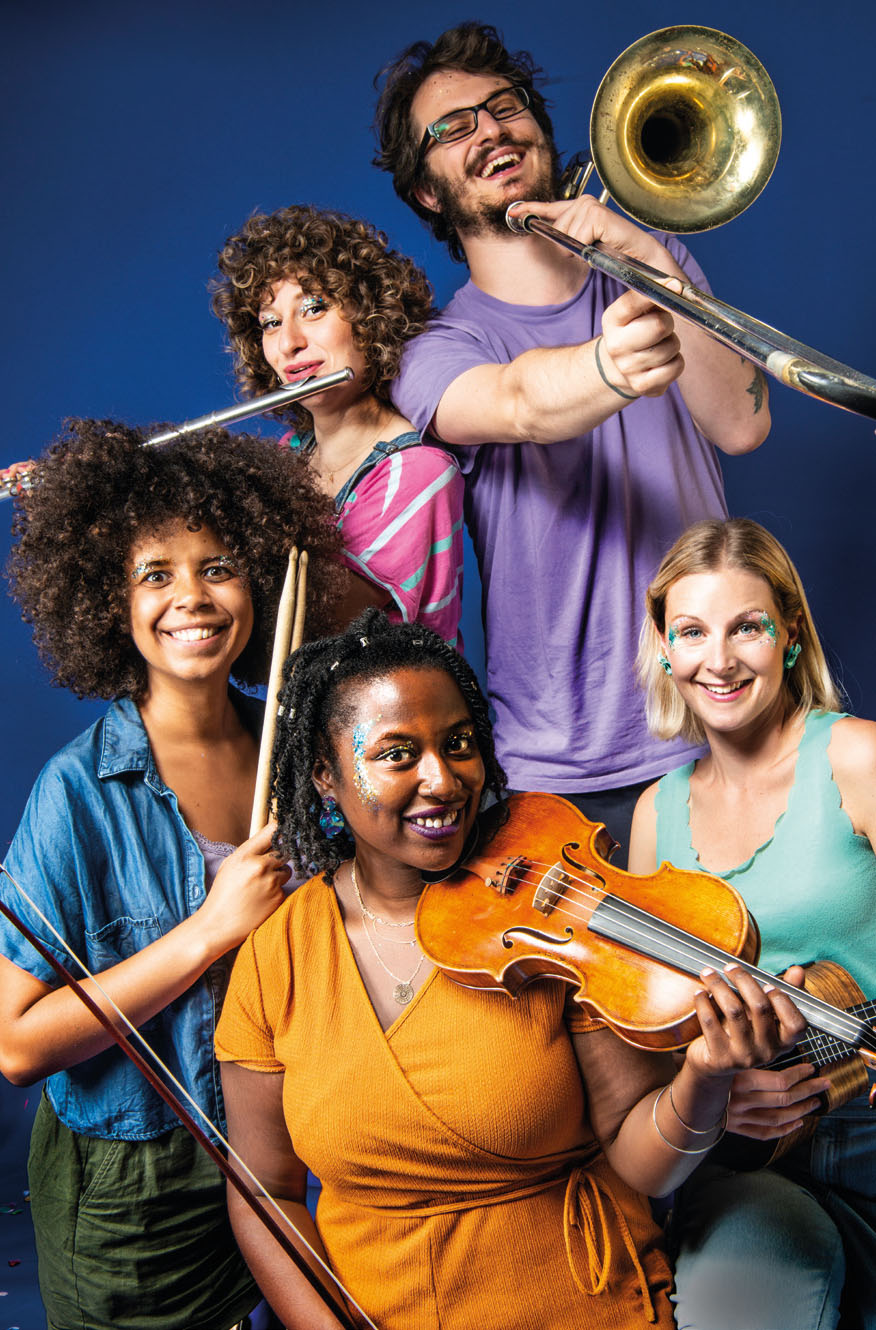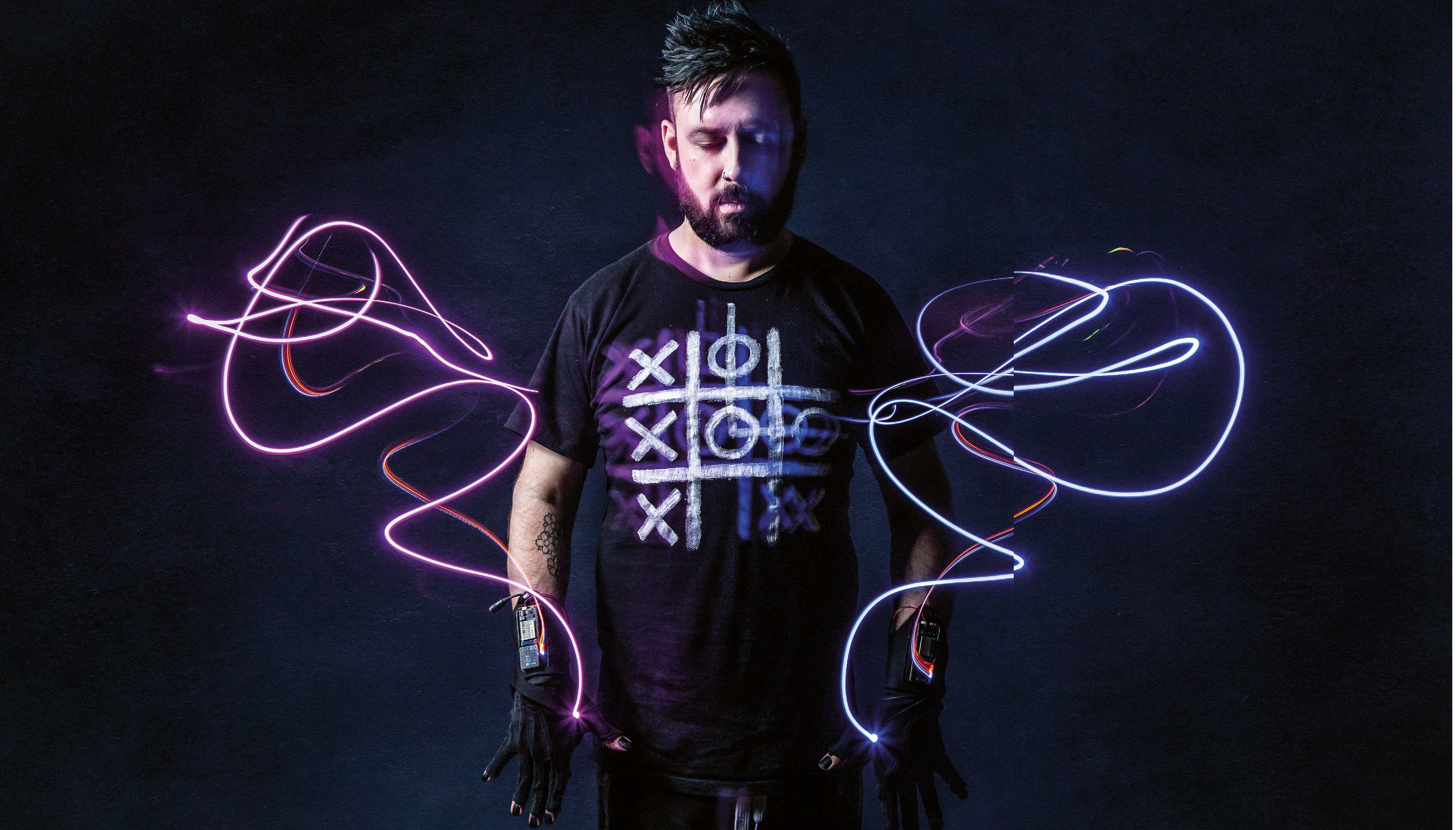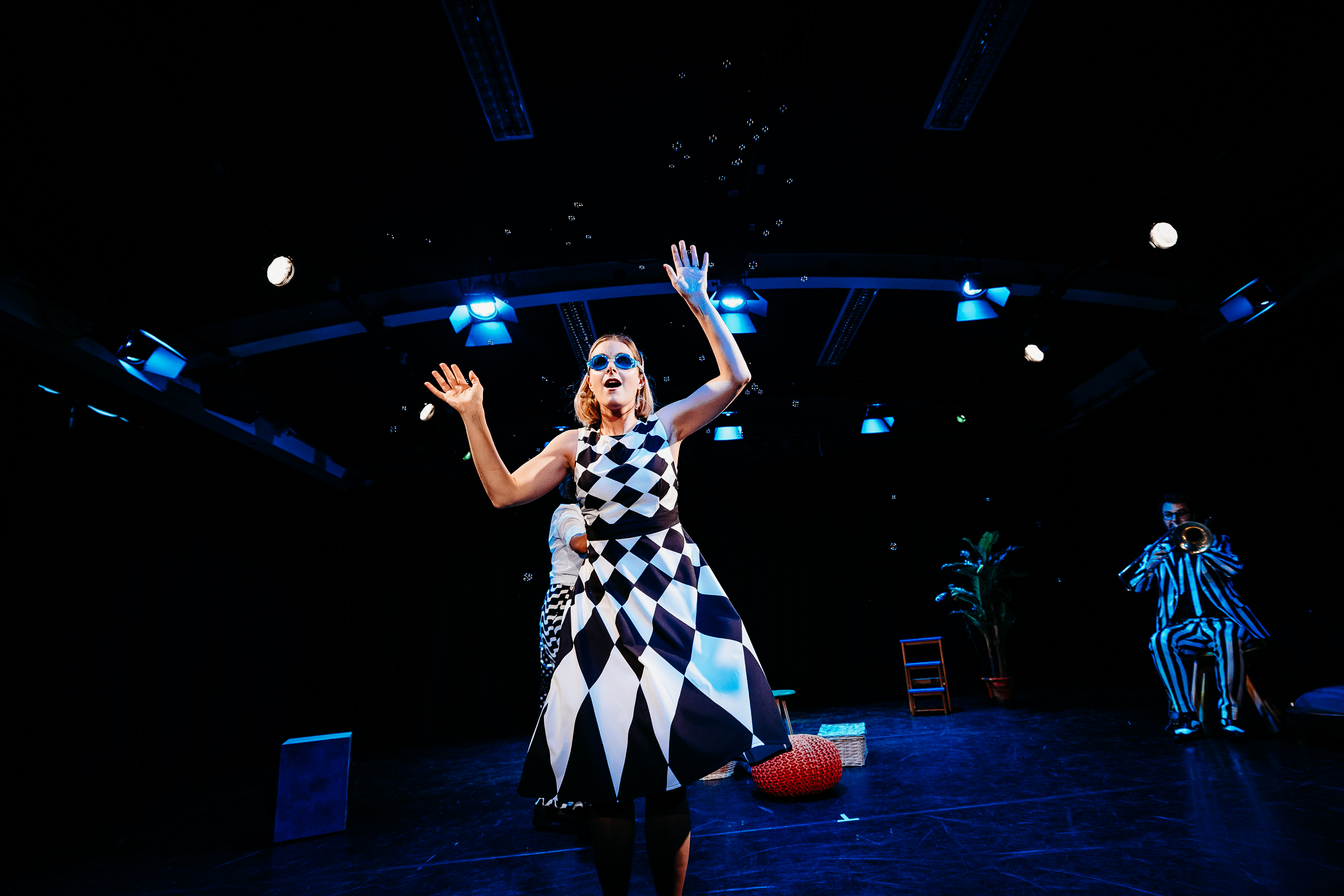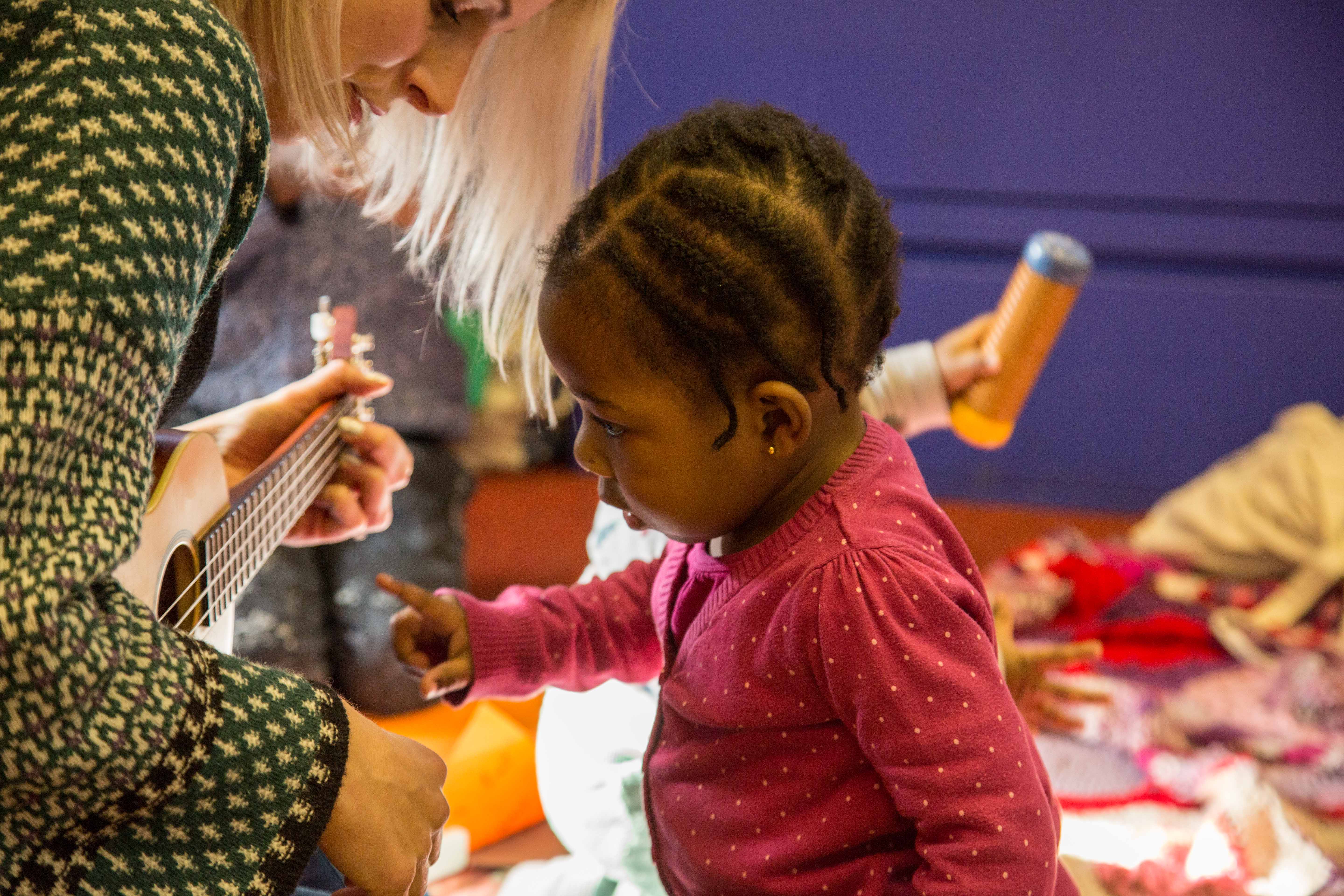
Seven years ago, a frustrated family music workshop leader who increasingly felt that the content of many traditional nursery rhymes was no longer appropriate, decided to take control and start her own music platform. With a modest grant from Sound Connections’ Innovate Fund, Rosie Adediran established London Rhymes, which won the Excellence in Primary/Early Years category at this year's Music & Drama Education Awards. Since 2015, the company has grown to encompass project work, song production, commissions, and a touring family show, all facilitated by a core team of seven musicians, spearheaded by Adediran. Two of the band members, both of whom work with London Rhymes as part of portfolio careers as workshop leaders and presenters, are percussionist Rosie Bergonzi and clarinet player Jessie Grimes.
While Adediran is humble about what she's achieved, Bergonzi and Grimes are overflowing with praise. ‘Rosie's managed to hold on to people who are incredibly busy in other areas,’ says Grimes, ‘because it's such high-quality work that we've prioritised it. The level and the standard of each individual strand – from our work in the Mother & Baby Unit in a psychiatric hospital, to The Magpie Project with women in temporary housing, all the way to the show – it's all the most incredibly brilliant standard and quality.’ All three musicians describe the strong sense of community at London Rhymes – a stark contrast with some of their other work as solo workshop leaders. Bergonzi adds: ‘I just find London Rhymes to be really fun and joyful, in all its different iterations – the way we take a song, and it goes all the way through the different stages. We get to be (often literally) on the ground seeing the process from the workshop to the stage or the recorded track. And I listen to them in my own time, even though I don't have children.’
The lifespan of each song is different depending on the project, says Adediran. ‘Sometimes they exist in the session and aren't suitable for a bigger audience because they're very specific or too personal. But I'm always struck by how songs that are written by such different groups – mums in temporary housing in Newham and mums who are in hospital with mental health issues – can have such universal themes that parents and families can all relate to.’ The London Rhymes project work is in collaboration with Creative Futures and varies from 12-week projects to longer-term residencies. London Rhymes has been involved in The Magpie Project, for example – a charity working with women in temporary housing in Newham – for four years.
Listening to the songs on Spotify or YouTube, you wouldn't know that most of them have their origins in workshops with women in extremely challenging circumstances. Illustrated by fun and diverse cartoons, the songs range from We're all amazing and Let's be kind to It's nappy time and Mummy loves you. ‘I think there's something really powerful about that – they're written by people having the roughest times, but they're able to find that core of joy and connection with their little ones,’ says Grimes. ‘It's really powerful and beautiful that such joy can come out of such darkness, and we're moving past Wheels on the bus to actually good quality songs for little people.’

Five of the London Rhymes musicians: Rosie Adediran (ukulele), Rebekah Reid (violin), Rosie Bergonzi (percussion), Rosanna Ter-Berg (flute), and Raph Clarkson (trombone) © RAH PETHERBRIDGE PHOTOGRAPHY
Instilling values
Last year, London Rhymes was commissioned by Sing Up to write their primary music curriculum, and so far, the team has written six units for nursery and reception. ‘It means we're able to reach so many schools and nursery settings with this content. We really thought about what kind of values we want to instil in little ones,’ says Grimes. ‘Rather than thinking about phonics,’ continues Adediran, ‘we were thinking holistically about the start of school and some of the things that three- and four-year-olds are going through. They're starting to discover who they are and that they're different from other children in their class. I think it's the age that lots of these realisations are happening, so we wrote a song about how families are all different, and in there was We're all amazing, and Yes I can!, which tackles gender stereotypes.’
‘Rosie has selected diverse, joyful people, and that means that anything we're feeling ourselves is going to come out in the songs,’ says Bergonzi, explaining that she and Aderdiran wrote We're all amazing in response to the Black Lives Matter protests. ‘The songs just share the social messaging of being yourself and being proud of whoever you are and choosing some specific things to be proud about. The wider context is that whoever you are, you're brilliant, which is a message to children and grown-ups,’ she says.
‘I don't think there are many resources that are dealing with these important questions and topics that little ones are talking and asking about. These songs do it in a joyful and playful way, which can make life easier for teachers and parents to have those conversations, and to let children know that it's okay to be who they are,’ adds Grimes. ‘We also want to write songs in response to real families today going through real challenges,’ says Aderdiran, ‘and the highs as well as the lows – what's fun about parenting, or what's the high point of the day, as well as what's really challenging.’


London Rhymes at Nottingham Playhouse. Credit: Ian Marshall
Openness, kindness, and okay-ness
As all workshop leaders will know, creating a ‘genuine collaboration’ between musicians and participants is challenging, particularly in song writing, but this is what London Rhymes aims to achieve. ‘Sometimes that might mean that we have an idea from a session we've run, and then we'll get our heads together as musicians and write something in response to that,’ says Aderdiran. ‘But then sometimes a mum has just come out with this incredible melody, and it's almost fully formed, and we'll work with it to create some lyrics together. It really varies how we write songs in response to the families we work with, and it's not pretending that we haven't been part of it. I've felt frustration as a workshop leader in the past when it hasn't felt like a genuine collaboration.’
At one point during the conversation, the musicians try to summarise ‘the London Rhymes method’ – the ethos that pervades all the work that they do. ‘I think at the core of it,’ says Grimes after some thought, ‘is an openness and a kindness, and an okay-ness for whatever is in the space.’ She describes the ‘chaos’ of some of The Magpie Project sessions, with children running around the room, taking the team's carefully planned agenda with them. ‘Sometimes it can feel completely wild, but Rosie is able to hold that space with confidence and assurance that means that the mums, who might not be able to trust very many people in their lives, begin to trust Rosie that it's okay to be the way they are, and it's okay to bring whatever they want to the project. And it's okay for them to just sit in the corner and have a tea because this is the only safe place they can be in today.’ The temptation is always there, Grimes adds, to micromanage and over-plan, but leaving time and space in the session means that the participants can been ‘heard and valued’.
Adediran acknowledges that they're ‘lucky’ to have the flexibility to leave the agenda behind – much more common in early years settings than in formal education for older children. The sessions are, the musicians stress, for the babies, toddlers, and older children, but are ‘really’ about the parents. As with most of their work, this varies, though: ‘It's about attachment and that moment of connection,’ says Adediran, ‘and sometimes, both at Magpie and at the hospital, the attachments are damaged between the primary caregiver and the baby. Sometimes it's about giving the baby lots of attention and eye-contact because you sense that the parent needs a break, but sometimes it's about trying to encourage the bond through songs.’


The Family Music Hub
While projects like those run by London Rhymes benefit mother and baby in many ways – whether by facilitating bonding or simply by enabling the baby to experience live music – Adediran has remained frustrated that many projects simply stop after 10 or 12 weeks. ‘I just felt like it wasn't enough, and what are we leaving behind?’ she asks. As a result, Adediran conducted a piece of research into the state of free music provision for families in freely accessible settings, like libraries and children's centres, funded by the Paul Hamlyn Foundation and with the support of Nicola Burke (author of Music Development Matters). ‘Essentially,’ says Adediran, ‘the research just made me aware of the power imbalance between musicians who get paid well and leaders who have to do a “rhyme time” session in a library but have had little training or support in working musically with a family audience. I did a big survey and wanted to talk to practitioners to see what their needs were, whether they'd had any training, and whether they felt supported. Surprise surprise, the majority had not had training, did not feel supported, and found it really, really hard.’
Excitingly, Adediran, Burke, and music teacher and researcher Katie Neilson have, for the last couple of years, been working on a project that they hope will go some way to solving these challenges. Funded by Youth Music, they are creating The Family Music Hub, and have just launched their first action research project with Early Education. ‘This is part of my response to the state of music education in the family music world,’ says Adediran. ‘It's happening – soon.’
The Family Music Hub team can be contacted on thefamilymusichub@gmail.com.
MDEA 2023 nominations are open until 12 September: www.musicdramaedawards.com.








